Freedom is a London-based anarchist website and biannual journal published by Freedom Press which was formerly a monthly newspaper.
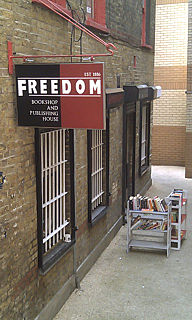
Freedom Press is an anarchist publishing house in Whitechapel, London, United Kingdom. Founded in 1886, it is the largest anarchist publishing house in the country and the oldest of its kind in the English speaking world. It is based at 84b Whitechapel High Street in the East End of London.
Clifford Harper is a worker, illustrator, and militant anarchist. He wrote Anarchy: A Graphic Guide in 1987. He is a long-term contributor to The Guardian newspaper and many other publications.

The Independent is a British online newspaper. It was established in 1986 as a national morning printed paper. Nicknamed the Indy, it began as a broadsheet and changed to tabloid format in 2003. The last printed edition was published on Saturday 26 March 2016, leaving only the online edition.
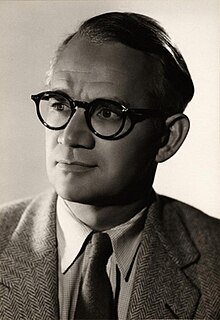
George Woodcock was a Canadian writer of political biography and history, an anarchist thinker, a philosopher, an essayist and literary critic. He was also a poet and published several volumes of travel writing. In 1959 he was the founding editor of the journal Canadian Literature which was the first academic journal specifically dedicated to Canadian writing. He is most commonly known outside Canada for his book Anarchism: A History of Libertarian Ideas and Movements (1962).
Donald Rooum was an English anarchist cartoonist and writer. He had a long association with Freedom Press who have published seven volumes of his Wildcat cartoons.

Anarchism in the UK initially developed within the context of radical Whiggery and Protestant religious dissent. Both during the English Civil War and the First Industrial Revolution, English anarchist thought developed in the context of revolutionary working class politics and an anti-establishment ethos.
Anarchism in South Africa dates to the 1880s, and played a major role in the labour and socialist movements from the turn of the twentieth century through to the 1920s. The early South African anarchist movement was strongly syndicalist. The ascendance of Marxism–Leninism following the Russian Revolution, along with state repression, resulted in most of the movement going over to the Comintern line, with the remainder consigned to irrelevance. There were slight traces of anarchist or revolutionary syndicalist influence in some of the independent left-wing groups which resisted the apartheid government from the 1970s onward, but anarchism and revolutionary syndicalism as a distinct movement only began re-emerging in South Africa in the early 1990s. It remains a minority current in South African politics.

Anarchy was an anarchist monthly magazine produced in London from March 1961 until December 1970. It was published by Freedom Press and edited by its founder, Colin Ward with cover art on many issues by Rufus Segar. The magazine included articles on anarchism and reflections on current events from an anarchist perspective, e.g. workers control, criminology, squatting.
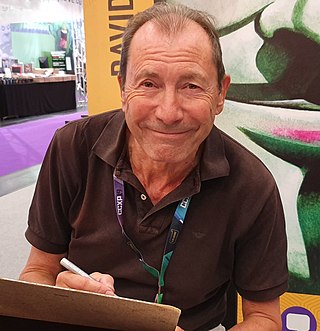
David Lloyd is an English comics artist best known as the illustrator of the story V for Vendetta, written by Alan Moore.
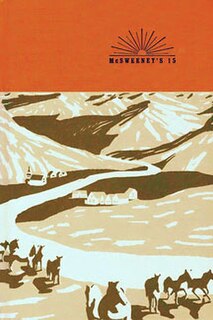
Timothy McSweeney's Quarterly Concern is an American literary journal, typically containing short stories, reportage, and illustrations. Some issues also include poetry, comic strips, and novellas. The Quarterly Concern is published by McSweeney's. The journal is notable in that it has no fixed format, and changes its publishing style from issue to issue, unlike more conventional journals and magazines. The Quarterly was first published in 1998, and it is edited by Dave Eggers.
Anarchism is generally defined as the political philosophy which holds the state to be undesirable, unnecessary and harmful as well as opposing authority and hierarchical organization in the conduct of human relations. Proponents of anarchism, known as anarchists, advocate stateless societies based on non-hierarchical voluntary associations. While anarchism holds the state to be undesirable, unnecessary and harmful, opposition to the state is not its central or sole definition. Anarchism can entail opposing authority or hierarchy in the conduct of all human relations.
Geoffrey Nielsen Ostergaard was a British political scientist best known for his work on the connections between Gandhism and anarchism, on the British co-operative movement, and on syndicalism and workers' control. His books included The Gentle Anarchists: A Study of the Sarvodaya Movement for Non-Violent Revolution in India (1971), coauthored with Melville Currell, and Nonviolent Revolution in India (1985), both dealing with the Sarvodaya movement. He spent the majority of his academic career at the University of Birmingham.
"The Raven" is a narrative poem by Edgar Allan Poe.
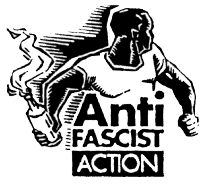
Anti-Fascist Action (AFA) was a militant anti-fascist organisation, founded in the UK in 1985 by a wide range of anti-racist and anti-fascist organisations.
Arthur Berney is Professor Emeritus at the Boston College Law School. Berney taught courses in constitutional law, communications, and National Security Law.
Anarchy is a society being freely constituted without authorities or a governing body. It may also refer to a society or group of people that entirely rejects a set hierarchy. Anarchy was first used in English in 1539, meaning "an absence of government". Pierre-Joseph Proudhon adopted anarchy and anarchist in his 1840 treatise What Is Property? to refer to anarchism, a new political philosophy and social movement which advocates stateless societies based on free and voluntary associations. Anarchists seek a system based on the abolition of all coercive hierarchy, in particular the state, and many advocate for the creation of a system of direct democracy and worker cooperatives.
The political philosophy of anarchism has had a small presence in New Zealand politics.
Anarchism in Croatia first emerged in the late 19th century within the socialist workers' movement. Anarchist tendencies subsequently spread from neighboring countries, taking root in a number of cities throughout the country. The movement experienced repression from a succession of authoritarian regimes before finally reemerging around the time of the independence of Croatia.








